Welcome to our German Shepherd puppy development stages and ages – week by week guide

Different breeds like all different babies develop at different rates. So, don’t be alarmed if your German Shepherd Puppy is slightly behind or ahead of the guidelines.
Knowing your puppy’s development stages can be a great way to measure milestones in your puppy’s life. There are going to be many exciting events for you to look forward to. Whether you are bringing your 8 week German Shepherd puppy home or about to be blessed with a litter of puppies. This is going to be an exciting, demanding but hugely rewarding journey.
Let’s start by taking a looking at newborn German Shepherd puppies.
Newborn German Shepherd Puppies:
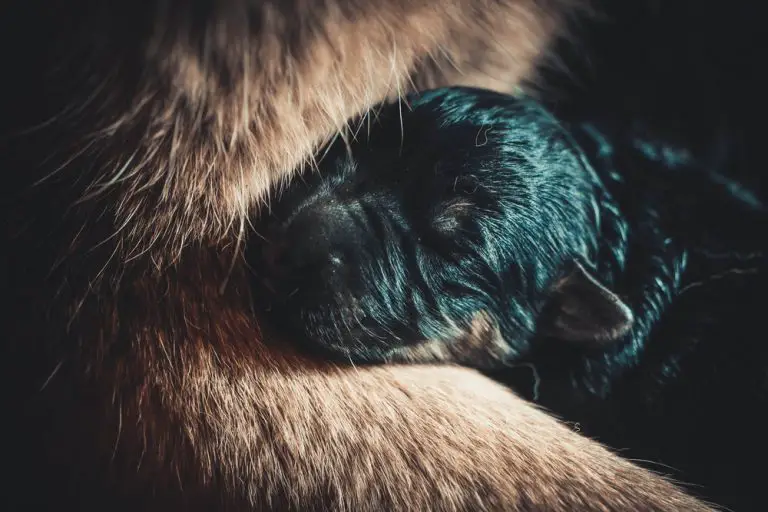

On average German Shepherds will have a litter of 8. For the first several weeks of your newborn puppy’s life they will be developing rapidly. Newborn puppies are born at around 58-64 days after fertilization. That’s an approximate gestational period of just 9 weeks. This is a very short gestational period which means a lot of the puppy’s critical organs including the brain are not fully formed at birth.
Newborn puppies are born with their ears and eyes tightly sealed. As with their brain puppy’s eyes and ears are underdeveloped and will need time outside the womb to continue to develop and mature.
The reason eyelids are sealed shut is to form a protective barrier for the fragile developing eye. This helps to protect them from any foreign object, bright lights, bacteria or any other microorganism that can cause disease or damage. In the same way puppies ear canals are closed at birth to make them effectively deaf. This is a protective barrier to protect the fragile underdeveloped machinery needed to hear. In a mature ear the pressure caused by sound will mechanically move structures in the ear. If the pup’s ears respond to sound before the fragile auditory machinery is fully developed this could cause long term damage.
German Shepherd puppies are highly dependent upon their noses. Puppies navigate by smell from the moment they are born. This helps them to identify their mom, the very important milk supply, siblings and surroundings.
Newborn puppies are born with a fur coat however they cannot control their own body temperature yet. To keep them warm they are dependant on their mothers or another heat source. If newborn puppies are cold they may cry but they do not have the strength to cry for very long, so it is very important to make sure you’re German Shepherd puppies are kept in a warm environment. If you live in a cooler climate installing a heat lamp would be ideal to help keep the puppies nice and warm.
Germans Shepherds make amazing mothers and will be relied on a lot at this stage. Mother dogs will only leave their newborn puppies to go to the toilet, eat and drink. However, when mom has gone the newborn puppies are not completely useless. They are able to use their front paws to drag themselves towards a heat source. When mom is away the puppies will crawl together to preserve their body heat.
Along with being able to drag themselves to a heat source newborn puppies are also able to drag themselves to their mothers to locate the milk supply. They will move their heads around to search for a nipple, latch on and suck strongly. Newborn puppies are not born with teeth these will also develop in the next several weeks.
Other than the above puppies are completely dependent upon the care of their dedicated mom. Newborn puppies have little control over the rear end of their bodies. To encourage their pups to pass urine and bowel movements the mom will lick their bottoms. Anything produced mom will then lick up and swallow to keep her puppies and nest clean. Now there’s devotion.
1 week old German Shepherd puppies:
2 week old German Shepherd puppies:
German Shepherd puppy’s eyes will either be partly or fully open by the time they are 2 weeks old. However, they won’t be able to see very clearly at first. When their eyes become wider, they will reveal blueish-gray eyes which are hazy in appearance. Their eyesight will continue to develop until around 8 weeks old.
The ear canals will also open around 2 weeks. The puppies hearing has been developing much quicker than their eyesight and they will be able to hear most things by the time their ear canals fully open. However, their amazing hearing ability will continue to enhance over the next several weeks.
At the moment your German Shepherd puppy will have cute floppy ears. Their adorable tall ears can come up anywhere between 8 weeks and 6 months of age. Floppy ears are common until your German Shepherd finishes teething. By then the ear cartilage will become strong and hard enough for the ears to stand up permanently.
Now is a good time to start handling the puppies and get them used to your voice. Most puppies are wormed for the first time when they are 2 weeks old.
All this development has happened so quickly, but things are about to get even more exciting. Between 2 and 4 weeks your German Shepherd puppy will begin to stand up this is when the real fun begins.
Puppies milky teeth will also start to develop between 2 to 4 weeks. These sharp little teeth will remain until about 14-30 weeks of age. German Shepherd’s baby teeth are very sharp, this is for several reasons.
These little daggers play an important role during the weaning process. Even the most patient moms will struggle to nurse with these sharp painful teeth. This reluctance to nurse will prompt the German Shepherds to seek alternative food sources. These sharp teeth will then help to make up for the lack of jaw strength when eating solid foods.
Finally, these sharp puppy teeth play an important role in teaching the pups to gauge their bite pressure when playing with their mom and siblings. This is an essential life lesson that enables our powerful German Shepherds to become safer companions as they mature into strong adult dogs.
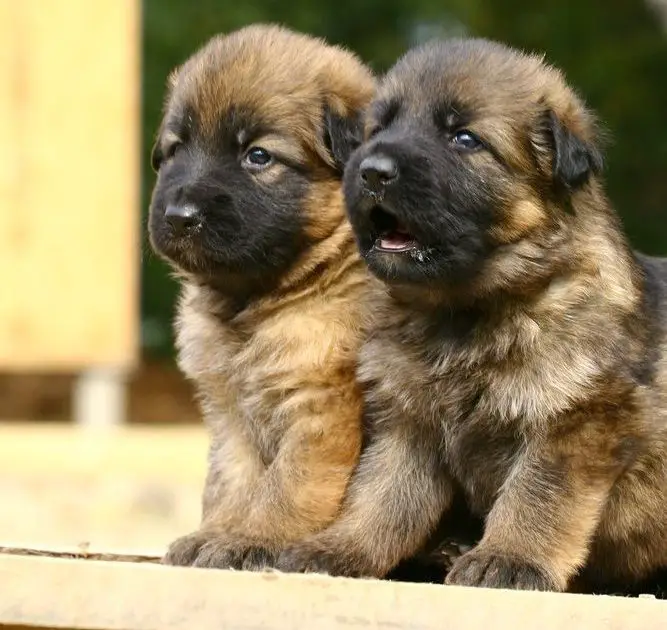

3 week old German Shepherd puppies:
No longer will the German Shepherd puppies look like a row of fat fluffy burritos. During the last few weeks mom has done an amazing job of getting her babies strong and their mobility will have come on leaps and bounds (well not quite yet) but by 3 weeks of age your German Shepherd puppy will begin to trotter around.
Most 3 week old German Shepherd puppies can stand and sit. It’s this week their individual personalities will begin to develop.
With their baby teeth starting to cut through a lot of breeders. Especially those with large litters will start introducing some solid foods. This helps relieve some of the pressure for the devoted German Shepherd mom. When weaning puppies, you need to start off by soaking their food in either water or puppy milk replacement formula to make it mushy and more comfortable for them to eat. The soaking process also helps the pup’s transition from liquid to food easier. It’s important to remember that your German Shepherd puppy will not have a full set of puppy teeth until they reach between 8-10 weeks old.
Puppies have sensitive stomachs so gradually introducing German Shepherd puppies from mom’s milk to solid food also will help to keep stomach upset to a minimum.
3 week old puppies are great fun to watch. As they start to interact and play with their siblings their personalities will really start to show. You may also notice them starting to playfully growl at each other. At 3 weeks old it will become easier to start identifying different members of the pack.
4 week old German Shepherd puppies:
German shepherd puppies will look much more dog like at 4 weeks of age. Breeders and moms will be kept on their toes and paws over the next few weeks. As the pups start getting more confident on their feet they will be running around and playing enthusiastically.
4 week old German Shepherd puppies will start communicating and expressing their emotions more. At 4 weeks old they will begin to wag their adorable little tails.
With solid food becoming a major part of their diet the pups will be passing bigger bowel movements. They will be able to show more control of their bowel movements as they take themselves away from their brothers and sisters to perform their business. At this stage mom will be taking a much more relaxed approach to parenting and there will be a lot more for the breeder to clear up.
By this point mealtimes are a messy process. If it is warm and safe enough to do so we would recommend taking the pups out in the yard for feeding.
German Shepherd puppies are becoming a lot stronger at vocalisations by 4 weeks old. When mom returns to her babies the litter will noisily greet her.
Around 4 weeks of age your puppies will need to be wormed again.
5 week old German Shepherd puppy :
At 5 weeks German Shepherds are at a key development phase. From this week onwards human interaction is very important in order to form relationships with people. For puppies who are kept in kennels it’s important for them to be bought into the family at regular intervals to form these relationships.
5 week old German Shepherds from this week onwards will start to learn a lot about the home environment. Including different noises and smells. This exposure will ensure your German Shepherd puppy turns into a confident, friendly individual.
Mom will also be doing an important job of teaching her puppies to not bite too hard. German Shepherds jaws are very powerful, and an adult German Shepherd dogs bite can easily break a human’s bones. Even an 8 week old German Shepherd puppy would have the power in their jaws to break the smaller bones in humans fingers. This is why mom teaching her puppies bite inhibition is so important. For more information on bite inhibition please see our guide on German Shepherd bite inhibition.
By 5 weeks old German Shepherd puppies will be eating a lot of solid foods, several times throughout the day. Those sharp little teeth would have done their job and mom will be gradually weaning her pups of the dependency on her milk. When mom does feed her puppies, she will only do so for a short period whilst standing up.
6 week old German Shepherd puppy:
At 6 weeks of age German Shepherd puppies will be fully weaned. They will be eating between five and six small meals a day.
Although the pups no longer rely on mom for milk, they still need her help and guidance for the next few weeks. Mom will be teaching her babies important life skills to live alongside humans.
In some countries 6 week old puppies are taken away from their mothers and moved into their new home. We would not recommend this as the puppies will miss out on continued bite inhibition training from their siblings and mother. This can result in a puppy who bites too hard which can be challenging to manage as they get older.
6 week old German shepherds growth is not as fast as it has been in the weeks beforehand however over the next few months they will still have lots of growing to do.
In the USA your puppy will be due their first combined 5-in-1 vaccine at 6 weeks old. This vaccine helps to immunizes your puppy against hepatitis, parvo, distemper, parainfluenza and coronavirus. Most puppies will also need to be wormed again at 6 weeks old.
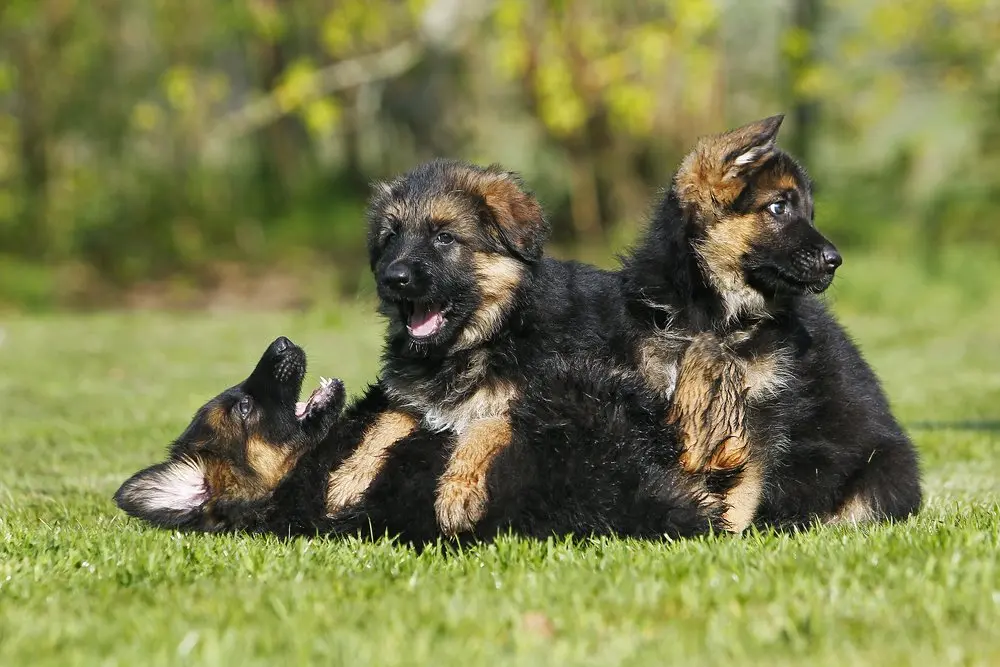

7 week old German Shepherd puppy:
For most German Shepherd puppy’s week 7 will be the final one spent with their mother, brothers and sisters. Their last week together will consist of plenty of socialization and playing.
Most breeders will arrange a 7 week health check up with the vet to make sure your bundle of fluff is fit and healthy to go to their new home. In the UK some breeders will arrange for the pups first 8 week vaccination to take place during this check. Although some vets advise against it.
By the end of this week German Shepherd puppies are ready to leave their mothers and move into their new homes for good.
8 week old German Shepherd puppies:
If you’re the new owner of a German Shepherd puppy this maybe the week you’ve been dreaming of. The week you get to take your new puppy home. This will be a very exciting time, but you may also be feeling a bit nervous. This is completely normal it’s a lot to take on, but the rewards are endless. There will be some challenged along the way for new puppy owners and your puppy will take some time to adjust to life without its mother and siblings.
If you’re in the UK and your puppy hasn’t had their first 8 week vaccination before you collected them you will need to arrange for this to happen within the next few days. In the UK the first combined vaccination will help to immunizes your puppy against distemper, parvovirus, leptospirosis and hepatitis. The first puppy injection in the UK typically will happen between 8 and 10 weeks. With the second dose usually being given 2 to 4 weeks later
It’s best to start potty training your puppy from day one. Some breeders would have trained the puppies to poop and pee on newspapers or puppy pads. From the moment you get them home it is important to show your German Shepherd puppy where to pee and poop. Puppies naturally like to pee where they have done so before so to avoid building history of peeing in your home is best if you can to avoid it.
The more you can avoid accidents from happening as much as possible from the start the faster the puppy training process should be. It’s important to take your puppy out for regular toilet breaks even throughout the night until they have better control over their bowel movements. All puppies are different, and some will get this quicker than others.
The main thing to remember is not to discipline your puppy for accidents. The most successful way to potty train is to reward success and ignore accidents. Just clean them up quickly and thoroughly. Your puppy will love nothing more than being praised. For more information please see our guide on How to potty train your German Shepherd puppy.
9 week old German Shepherd puppy:
Your new addition may have been joining you in your new home for a week or so. Already your German Shepherd puppy will feel like part of the family. German Shepherds puppies are always adorable but at 9 weeks they are at the age where they are still puppy-like but very clumsy,curious and keen to play with her new family, which is very cute. Your German Shepherds unique personality will make you feel very proud.
At 9 weeks your cheeky German Shepherd pup will be feeling more confident, with this the need to explore everything and anything may end up getting them into trouble.
Your puppy will develop new sleeping patterns and feeding routines which you will need to adapt to.
Most puppies will sleep between eighteen and twenty hours a day at 9 weeks old. There’s so much for a puppy to see and do. It’s a very tiring business. During the day when you are with your puppy generally you will not need to shut them away in a crate to nap.
German Shepherd puppies are often more than happy to sleep whilst family life goes on around them. However, there will be times when sleeping in a crate is better and safer for your puppy.
You must not leave a 9 week old puppy to sleep outside the crate if you are not home to watch them if they wake. Puppies are into everything and many innocent items found in the house could be a potential hazard to your inquisitive pup. For more information please see our guide on how to puppy proof your home.
If you have another dog or young children it’s better for the pup for you to step in and make sure your puppy can nap if they need to. Even if your puppy can barely keep their eyes open other pups and children will still want to play and your German Shepherd puppy may find it hard to refuse. After a hard day of play the peace and quiet of a crate will enable your pup to have a well-deserved nap.



If your German Shepherd puppy does need to go to the toilet in the night make sure you keep it short and to a minimum. To ensure your puppy doesn’t get into the habit of waking you for some fun in the night it’s important to create a calm, no fuss environment. As adorable as your German Shepherd puppy is you probably don’t want to get into a 3am play session.
Establishing a daily routine is the best way to get your German Shepherd puppy to sleep through the night. Part of this schedule will involve mealtimes. Your 9 week old puppy will need four meals a day. Split these up throughout the day and try to stick to similar times.
It is recommended that you don’t feed your puppy within the first hour of waking. This is to stop encouraging your puppy to wake up earlier and earlier because they associate waking with food.
9 weeks old is a great time to start training your German Shepherd puppy some basic commands including ‘come’ and ‘sit’. You should always reward your puppy either vocally, with a favourite toy or treats for good behaviour and ignore bad behaviour. Puppies and dogs want to be praised so they respond very well to positive encouragement.
Punishing puppies and dogs may have a short term positive effect on their behaviour but long term you could be setting them up to fail.
It is very important to socialise and expose your puppy to other humans, dogs and different scenarios whilst they are young. This maybe hard before your puppy has had all its vaccines however getting many different people to come and visit you at your home will enable them to get used to visitors.
Before their full vaccinations you can also, you can take you German Shepherd puppy out and about with you to expose them to the outside world as long as you can carry them.
If you live in the USA, your puppy will be due their second combined 5-in-1 vaccine at 9 weeks old. This vaccine helps to immunizes your puppy against hepatitis, parvo, distemper, parainfluenza and coronavirus. In the USA a minimum of three sets of the combined vaccine are required for your puppy.
10 week old German Shepherd puppy:
At 10 weeks old socializing your German Shepherd puppy is still one of the most important jobs for you to do. Although you cannot put your puppy down outside until after their final vaccination. It’s still a good idea to get friends over or if you can carry them and take them out and about with you as often as possible.
Make sure you know when your German Shepherd puppy’s final vaccination is:
- If you live in the UK and your German Shepherd puppy had their first set of jabs at 8 weeks they are due their booster between weeks 10 and 12. Puppies 10 week injection In the UK is a booster vaccination to help immunizes your puppy against distemper, parvovirus, leptospirosis and hepatitis. Check with your vet what date after their jabs your German Shepherd puppy will be able to go down outside. Your puppy will then need a booster between 6 and 12 months old.
- If you live in the USA at 12 weeks old your German Shepherd puppy will be due their booster for the combined 5in1 vaccine (against hepatitis, distemper, parainfluenza, parvo and coronavirus) and a vaccine against rabies and leptospirosis. If you live in a high risk area, they may also need to be given the vaccination to help immunize them against Lyme. If applicable at 16 weeks your German Shepherd puppy may need to have a fourth combined 5in1 vaccine. A minimum of three combined injections are required in the USA. So, if your German Shepherd puppy is only scheduled to have three courses don’t worry. Check with your vet what date they will be able to be out down outside.
By 10 weeks old your German Shepherd puppy will be able to control their bladder a lot more. Potentially up to several hours. It should be allowing you to get a relatively decent night’s sleep.
3 month old German Shepherd puppy:
By 3 months old your German Shepherd puppy should be fully immunized but check the definite date with your vet. This is great time for you to introduce them to the big wide world and develop their social skills which you have already been building the foundations.
When taking your German Shepherd puppy out try to introduce them to as many other friendly dogs, humans and noises you can. This will help your German Shepherd puppy to grown into a confident well-rounded dog. If you don’t socialize your puppy, they will at some point lose their friendly fearlessness which will make it much harder to get them to accept other dogs, humans and environments when they are older.
At 3 months old your German Shepherd will go down from four daily meals to three. These three portions will be larger than what they are used to which may cause stomach upset. If your German Shepherd puppy does get an upset stomach, try going back to four smaller meals for a couple of days and they try the three larger portions again.
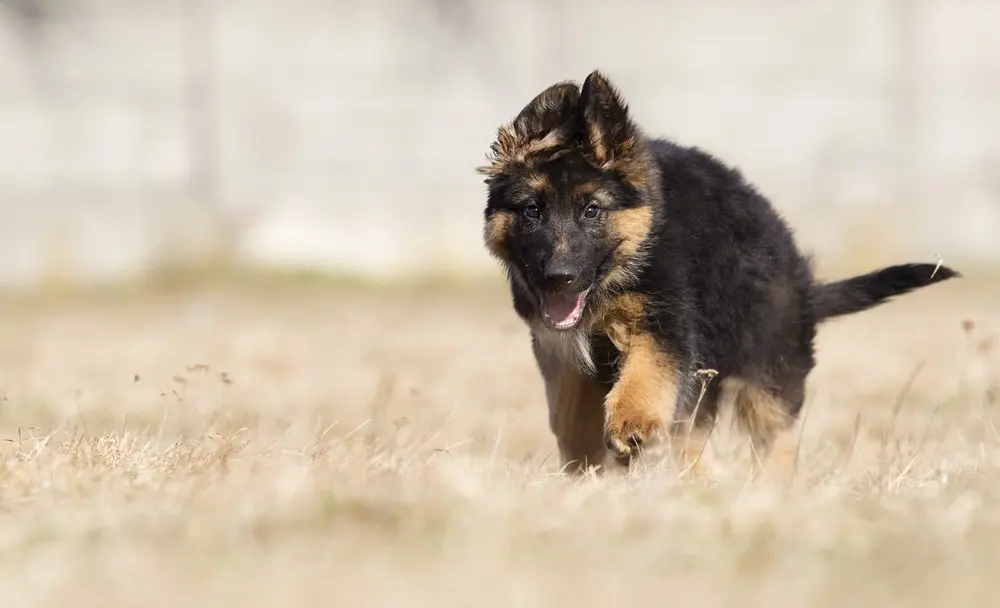

4 month old German Shepherd puppy:
Your German Shepherd puppy will start teething around 3-4 months as they lose their baby teeth. This can be a challenging time as your adorable German Shepherd puppy turns into a furry crocodile.
Luckily the teething stage is only a phase (as with human babies) and short lived. In most cases your puppy biting should stop around when they are around 7 months old and have their adult teeth.
You maybe noticing your German Shepherds gorgeous ears fluctuating between floppy and pointy. By the time your puppy has finished teething their ears should tick up all the way. This usually happens around 5-7 months. The reason they don’t start to stick up earlier is their cartilage is not strong enough to hold up the weight of their big ears. As they grow their cartilage becomes stronger.
By 4 months old most puppies will be potty trained but don’t be alarmed if your Germans Shepherd puppy isn’t. Some puppies need another month or so to help them cope without going out for frequent toilet breaks. Even when your German Shepherd puppy is toilet trained occasional accidents are normal. For more information please see our guide on How to potty train your German Shepherd puppy.
5 month old German Shepherd puppy:
Your 5 month old German Shepherd puppy will already be at least half its adult height. If their ears are sticking up, they may look massive on your pup’s head. German Shepherds do have large ears but they tend to grow into them as they get older.
German Shepherd puppies will begin to grow their new adult coat between 4 and 6 months old. To make way for their adult coat all the puppy hair has to go. For several weeks you will notice an increase in shedding. This is a completely normal part of growing up for your German Shepherd.
In fact, shedding in general is completely normal for German Shepherd’s. They aren’t called ‘German Shedders’ for no reason. Being a double coat breed German Shepherds dogs have a topcoat and an undercoat. Twice a year your pup will shed their undercoat. Usually in spring and again in fall. They also shed in general 365 days a year so be prepared for a lot of fur!
6 month old German Shepherd puppy:
When your German Shepherd puppy is 6 months old, they will be able to drop down from three meals a day to two.
6 months is major milestone for your puppy. They will very much look like a smaller version of their adult selves. Although your German Shepherd may look older on the inside, they are still very much a puppy.
If you are looking to get your puppy neutered or spayed the recommended age is 6 to 9 months. However, it is common for some female puppies to get spayed at 4 months old. Most German Shepherd females won’t come into season until they are about 9-12 months old however some can have their first season at 6 months old, especially if she is a miniature German Shepherd.
Be aware if you haven’t had your female German Shepherd spayed the possibility of pregnancy could be on the horizon if she is exposed to a male dog.
Summary:
Your German Shepherd is bound to give you so much joy and happiness throughout its life. There will be challenges along the way but remember this is completely normal.
German Shepherds are such an amazing breed and you will have a loyal friend for life. If there are any questions or concern’s you have please feel free to contact us and we will be more than happy to assist.
Your German Shepherd puppy will grow up very quick so it’s a good idea to document their growth so you can look back at all the memories and phases your made and overcome together.

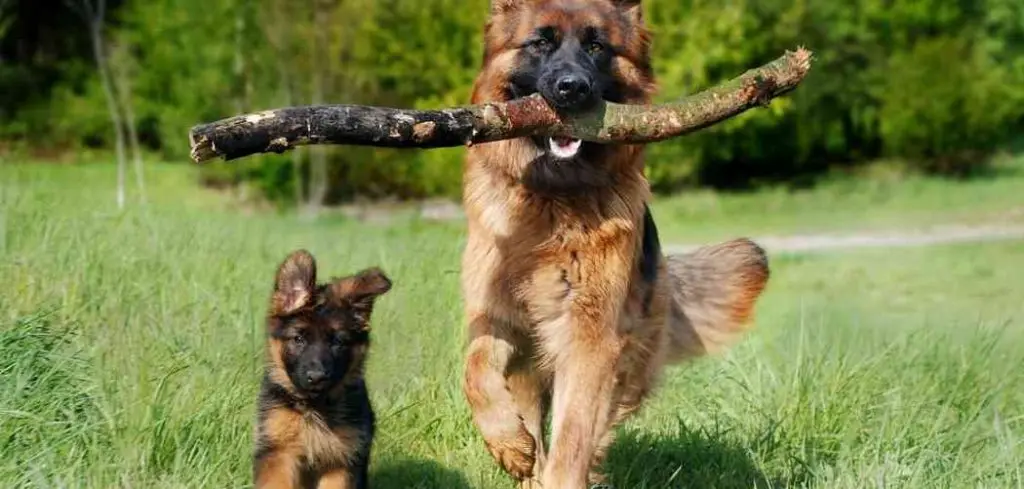
2 thoughts on “German Shepherd puppy development stages and ages – week by week guide”
Nicely written, I have a 11 week old hard head, she is 20 lbs^, sometimes cooperative sometimes a terror, biting, not doing what I ask, which I know she knows, generally I feel like trading her in on a calmer dog but will keep this one cause I’m hard headed too!
Good read, I have a 5 and half month old female, she chews, she still pulls on walks, trying to stop that and chasing her tail, besides that she’s smart as hell, thanks for info